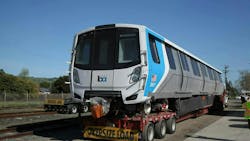BART, MARTA approve FY26 operating and capital budgets
Bay Area Rapid Transit (BART) and the Metropolitan Atlanta Rapid Transit Authority (MARTA) have approved balanced operating and capital budgets for fiscal year (FY) 2026.
BART’s FY26 budget helps close a projected $35 million deficit
The BART Board of Directors adopted a balanced budget for FY26. According to BART, the adopted budget protects the agency for one more year before facing a fiscal cliff in FY27 that could have widespread impacts on the Bay Area's greater transportation network.
The agency notes the board continued its strategy of avoiding service cuts by using the remaining $318 million of state and regional emergency funds to help pay for the cost of running train service while supporting deficit-reducing, cost-cutting measures, such as a strategic hiring freeze and running shorter trains. A planned 6.2 percent fare increase, expected to go into effect Jan. 1, 2026, also helps close a projected $35 million deficit.
BART notes the FY26 budget is also supported by a fiscal year-over-year four percent increase in paid trips thanks to new fare gates, new fare programs such as Clipper BayPass, offering employer-paid unlimited transit passes, attracting more riders with a cleaner, safer ride, and schedule coordination with connecting transit agencies.
The agency says its overall expenses grew by less than one percent in FY26, demonstrating that cost controls and targeted cuts to non-labor expenses are holding costs down, as well as the effectiveness of BART’s disciplined approach to belt tightening and prudent fiscal management. BART notes no new positions were added to the budget and dozens were frozen in a strategic hiring freeze.
“Our riders are noticing the improvements we have made to the overall BART experience, resulting in the highest satisfaction rates in 10 years,” said BART Board President Mark Foley. “We made strategic decisions in this budget to show the Bay Area we must be part of the solution in reducing costs, but also ensuring we have frequent, clean and safe service at this critical moment when traffic congestion is increasing, and people are returning to the office and wanting to take car-free trips on nights and weekends as well.”
According to BART, the $1.2 billion operating budget will continue to fund the current service plan with no planned cuts to service this fiscal year. In August, small adjustments will be made to BART’s schedule in coordination with other transit systems to improve timed transfers with Caltrain at Millbrae Station and to improve transfers with Wheels Bus service at Dublin Station. Improvements to the BART to Antioch transfer are also planned.
While the FY26 operating budget includes $35 million in reductions and cost controls, the agency notes the cuts will not impact BART’s ability to provide clean and safe service or impact BART’s efforts to have an increased safety presence on trains and inside stations.
BART says its $1.1 billion capital budget prioritizes funding Fleet of the Future rail cars, BART’s project to upgrade its aged train control system to a modern communications based train control system, new traction power equipment which will improve reliability, new escalators, a new BART Police headquarters and other rebuilding efforts. According to the agency, 98 percent of the capital investments are allocated to system reinvestment and service and capacity enhancements that will allow the agency to continue to serve as the backbone of the region’s transportation system. BART notes the projects are funded by voter-approved Measure RR and other local, regional, state and federal grant sources, in addition to allocations from BART’s operating budget to help pay for essential projects.
According to the agency, the FY27 preliminary budget, which includes no emergency assistance, shows a $376 million deficit due to BART’s outdated funding model and the fact the Bay Area has embraced remote work at higher rates compared to the rest of the country. The BART Board has voted to support State Bill 63, also known as the Connect Bay Area Act, which would authorize a regional transportation funding measure on the November 2026 ballot to enact a sales tax in Alameda, Contra Costa and San Francisco counties, with an option for San Mateo and Santa Clara counties to opt in. Funds from the measure would support transit agency operations and rider-focused transit coordination improvements.
The agency is also advocating for state budget funding to prevent service cuts in FY27, as well as requesting that BART’s current funding allocations from state programs continue to be honored in the coming state budget, which is under development now.
MARTA’s FY26 budget reduces costs while prioritizing projects that enhance safety, improve cleanliness and increase service reliability
The MARTA Board of Directors adopted the authority’s $1.55 billion FY26 operating and capital budgets. The budget includes $652 million in net operating funds and $901.8 million for capital programming.
MARTA says it continues to show fiscal responsibility, balancing the budget for a 14th consecutive year without a fare increase and reconfirming AAA and AA+ bond ratings. The budget reduces costs while prioritizing projects that enhance safety, improve cleanliness and increase service reliability, including new trains, a redesigned bus network, station rehabilitation and a new fare collection system.
“The next fiscal year will be one of incredible improvement, with systemwide once-in-a-generation investments that ensure a safer, cleaner, more reliable MARTA,” said MARTA General Manager and CEO Collie Greenwood. “Customers will see new state-of-the-art railcars, a better, more flexible Breeze system and an entirely redesigned bus network that increases service frequency.”
MARTA derives a significant part of its operating budget from sales tax revenue, which is forecasted to be more than $400 million in FY26, with passenger revenue and federal assistance being the next largest sources of operating revenue at a combined $155 million. The operating budget assumes a three percent salary increase for non-represented employees and fully funds the collective bargaining agreement obligations. Additionally, it accounts for an increase in healthcare and pension costs and includes a net reduction of 191 positions, many of which are currently vacant.
The agency says its capital improvement program continues to advance, with projects in the More MARTA Atlanta Program under construction such as the Rapid A-Line in Summerhill and the Five Points Station Transformation and those in various stages of planning and development such as the Bankhead Station platform extension and Cleveland/Metropolitan Avenue Arterial Rapid Transit (ART). The More MARTA Clayton budget prioritizes Rapid lines in Southlake and along SR54 and advancement of the Clayton County Operations and Multipurpose Facility and Justice Center transit hub projects.
According to MARTA, the capital budget includes $115 million for the new trains, the first of which will enter service in FY26; $104 million for the implementation of the new fare system; and close to $50 million for the ongoing station rehabilitation program, a multi-year project that will enhance safety, cleanliness and reliability and the overall customer experience at all 38 rail stations.
“We had to tighten our belt this year, but we remain committed to growing ridership and making good on commitments to our jurisdictional partners,” said MARTA Board Chair Jennifer Ide. “By keeping safe, clean and reliable as our north star, we were able to focus on necessary system improvements while remaining good stewards of public money.”
About the Author
Brandon Lewis
Associate Editor
Brandon Lewis is a recent graduate of Kent State University with a bachelor’s degree in journalism. Lewis is a former freelance editorial assistant at Vehicle Service Pros in Endeavor Business Media’s Vehicle Repair Group. Lewis brings his knowledge of web managing, copyediting and SEO practices to Mass Transit Magazine as an associate editor. He is also a co-host of the Infrastructure Technology Podcast.

